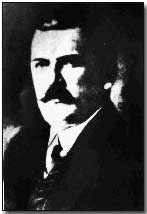Primary Documents - Brazil's Explanation to the Vatican of the Reasons for War, October 1917
 Reproduced below is the
text of an open letter sent by Brazil's Foreign Minister, Dr Nilo Pecanha,
to the Brazilian Ambassador to Pope Benedict. Its content was clearly
intended to be read not only by the Vatican but also by countries worldwide.
In essence the letter constituted Brazil's justification for its decision to
go to war with
Germany on 26 October 1917.
Reproduced below is the
text of an open letter sent by Brazil's Foreign Minister, Dr Nilo Pecanha,
to the Brazilian Ambassador to Pope Benedict. Its content was clearly
intended to be read not only by the Vatican but also by countries worldwide.
In essence the letter constituted Brazil's justification for its decision to
go to war with
Germany on 26 October 1917.
As a major Atlantic trading nation, Brazil had found itself increasingly threatened by Germany's declaration of unrestricted submarine warfare, culminating on 5 April 1917 with the sinking of the Brazilian ship Parana off the French coast.
Following the U.S. decision to enter the war on 6 April 1917 the Brazilian government severed diplomatic relations with Germany on 10 April 1917 preparatory to a subsequent declaration of war.
Public Note from Brazil's Foreign Minister Dr Nilo Pecanha to the Brazilian Ambassador to Pope Benedict, October 1917
The Brazilian Nation, which has never engaged in a war of conquest, but has consistently advocated arbitration as the solution for external conflicts in the constitution of the republic, and has no grievances and sufferings past or present to revenge; which has solved with serenity all questions regarding territorial limits, and with a precise knowledge of what belongs to her and an accurate acquaintance with the extent of her vast territory; which, thanks to the labour not only of her own sons, anxious to prove themselves worthy of so rich a patrimony, but of that of all foreigners whom our hospitality has assimilated; this nation, your Excellency can assure his Holiness, would have remained apart from the conflict in Europe in spite of the sympathy of public opinion for the Allies' liberal cause had Germany not extended the war to America and thereby prevented inter-trading between all neutral countries.
Without renouncing her obligations as an American nation, this country could not fail to assume the position of a belligerent as a last resource, without hatred or any interest other than the defence of our flag and our fundamental rights.
Happily today the republics of the New World are more or less allied in their rights, but all, equally menaced in their liberties and their sovereignty, draw closer the bonds of the solidarity which formerly was merely geographic, economic, and historic, and which the necessities of self-defence and national independence now make political as well.
For such reasons Brazil can no longer maintain her isolated attitude, and now, in close solidarity as she must be and really is with the nations on whose side she has ranged herself, she can even speak as an individual entity.
No Brazilian heart can receive without emotion the eloquent appeal of his Holiness in the name of the Almighty to the belligerents in the cause of peace.
Though no State religion has been adopted by Brazil, and all creeds are equally free, none the less Brazil is the third Catholic country of the world, and has maintained unbroken for centuries relations with the Government of the Holy See.
Brazil, therefore, recognizes the generous motives that inspired the appeal of his Holiness asking that by disarmament and arbitration and the establishing of a regime in which the brute force of armies shall give way to the force of moral lativ, the restoration of France and Italy should be granted, and the Balkan problem and the restitution of liberty to Poland be considered.
Only the countries most deeply interested in these questions can judge if the honour of their arms has been saved in this war, or if these modifications of the political map of Europe are likely to restore tranquillity.
So long as the political and military organization that suspended living law the world over and suppressed spiritual conquests supposed to be established beyond question - so long as this power continues to abuse the alleviating functions of war and to destroy the Christian spirit that inspired the society of nations, only these nations can say whether confidence in treaties has disappeared and whether any other force excepting some new spirit of order can be accepted as a guarantee of peace.
Through the sufferings and the disillusions to which the war has given rise a new and better world will be born, as it were, of liberty, and in this way a lasting peace may be established without political or economic restrictions, and all countries be allowed a place in the sun with equal rights and an interchange of ideas and values in merchandise on an ample basis of justice and equity.
Source: Source Records of the Great War, Vol. V, ed. Charles F. Horne, National Alumni 1923
The "linseed lancers" was the Anzac nickname assigned to members of the Australian Field Ambulance.
- Did you know?
